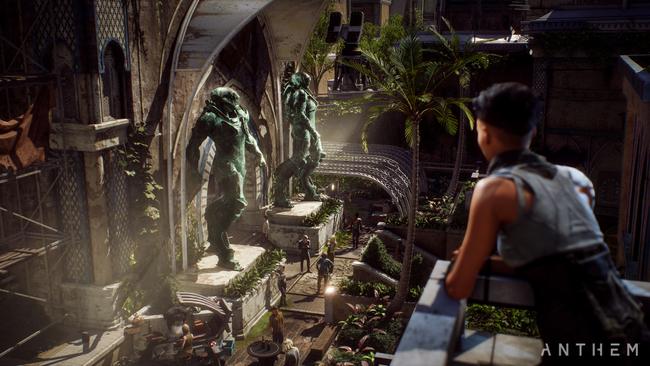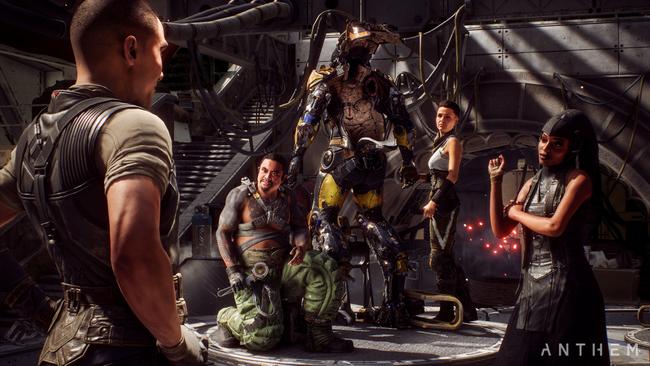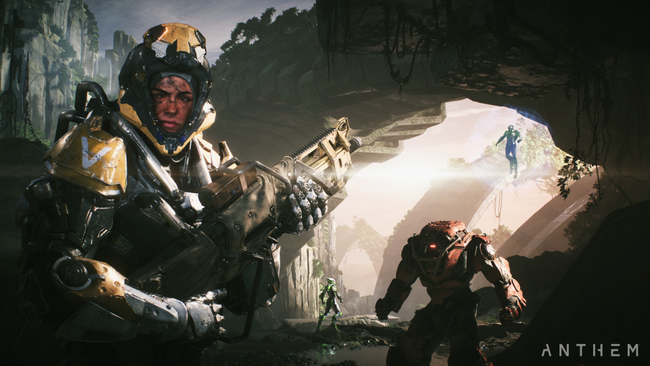Anthem Review
I’ve not taken issue with almost all the sins the gaming community perceives BioWare to have committed.
Mass Effect 3 is tied with The Witcher 3: Wild Hunt for my favorite game of all time. I thought its extended cut ending was perfect. I don’t think Mass Effect: Andromeda is a terrible game—it’s just not a great one. On top of that, I believe Dragon Age 2 has one of the best casts in all of video games and is a much better game than many give it credit for. I’ve loved the studio’s works strongly enough to credit it for changing my life and instilling me with the dream of working there someday.
In short: I’m rather biased towards BioWare.
This makes how little I like Anthem all the more disappointing. Despite skepticism and hesitations in the months leading up to its release, I remained optimistic. I believed that the things I love so dearly about BioWare would shine through. Instead, I’m sitting here writing a review punctuated by quiet sighs and utterances of disappointment, instead of singing a hymn of praise for the game. Anthem feels less like an evolution for BioWare and more like a deviation; it feels like an attempt at conformity that offers nothing that sets it apart from its competitors.

Anthem has you embody the role of a Freelancer, a mercenary-of-sorts whose job was once viewed as an incredibly respected honor. Freelancers have existed to bring stability to a world that is continuously shaped by what is known as the Anthem of Creation, an energy source created by a mysterious alien race from long ago. When those “Shapers” later vanished without a trace they left behind their tools which have the power to bring about unpredictable chaos to the landscape. As a Freelancer, you maintain the legacy of the Freelancers by taking up jobs to protect everyday people from the threats that are sprawling throughout the outside world, and you do it all in stylish exosuits known as Javelins.
There are no tendrils here that hint at the spirit and core of past BioWare games. Past titles have excelled in weaving fierce personality and beautiful imagery together. While Mass Effect and Dragon Age have memorable companions with varying quirks and complexities that are evident within moments of meeting them, Anthem’s cast of characters merely spout exposition and try to charm you with witty lines that ring hollow. Where Mass Effect had Saren and The Illusive Man and Dragon Age had Meredith and Solas, Anthem has no antagonists with individual identities. It has The Dominion and The Monitor and The Scars—faceless, unthreatening adversaries as generic as their names. They are foes that give no incentive to learn more about them throughout a twenty-hour story campaign that’s as unremarkably clear cut about a fight between good and evil as can get.
Anthem contains none of the heart with which BioWare so lovingly has crafted its best stories. There is one scene that offers some hope in the beginning through a combination of stunning visuals, exemplary music and significance to the story. Unfortunately, nothing afterward ever achieves anything approaching that high again. The narrative is delivered in short bursts after every mission but it all feels so disjointed, a feeling that is only emphasized by the tsunami of sci-fi jargon the game unleashes on you.
In between missions, you’ll have access to the game’s central hub and where you’ll chat with different NPCs, Fort Tarsis. It’s a chore to navigate; there are no points for fast-travel and your walking speed is rather slow (something that has been slightly fixed with the day-one patch). Its silence amplifies its lack of life—characters unconvincingly look like they’re chatting with one another as they stand in place and wait for you to approach them. It’s here where another glaring problem comes to the surface. BioWare games have always given you blank slates; to say that Shepard, Ryder or Hawke inherently had a personality is a lie. However, their games allowed you to paint those slates in the strokes and shades that you so desired, making them feel unique to you. You’ll always hear fans say something along the lines of, “My Shepard romanced Garrus,” or, “My Hawke supported the mages.” You won’t hear anything similar with the protagonist of Anthem, for even though they’re voiced, they possess less defined characteristics than even the silent Warden of Dragon Age: Origins.

The Freelancer will deliver sharp quips to their companion Owen or say something cynical about whatever is happening, but you’ll always be limited to merely two dialogue choices that happen all too infrequently and are of no consequence to either the story or the formation of their character. The game never gives you a brush with which to paint their canvas. Most of the time, you’ll be looking through the eyes of a character whose face you can only ever see at the very start of the game, which is when you decide which face they will have, and listening to their stale responses to equally stale lines of dialogue.
It’s all the more unfortunate considering how excellent the presentation of these characters can be. Anthem makes it immediately clear that a fourth Dragon Age game with its facial technology would be a dream come true. Characters are expressive and incredibly real—you can see their scars, pores, the twitch of a lip corner, the slight rise of an eyebrow. The voice-over work is phenomenal, for you’ll listen to actors deliver their lines so well that you might temporarily forget how uninspired the dialogue is.
For every potentially likable thing about Anthem, there is something that holds it back. Its expansive map filled with cascades and mist, sprawling vegetation and rocky cliffs is a sight to behold—but it isn’t stunning enough to justify the frustrating lack of fast-travel or the fact that it’s still essentially one jungle map with no areas that add visual variety. Yes, the freedom of the jetpack feels wonderful—except the game doesn’t make much use of it; not once did it make me go in its breathtaking underwater environments for a mission. Indeed, each Javelin is cool and feels different from the rest—but each one has only a few abilities so they feel deeply restricted. Missions with friends can be fun—until you realize that almost all missions will have you complete one of the same three objectives: collect orbs of echoes and bring them back to a central point, collect fragments and bring them back to a central point, and protect an area from a swarm of similar-looking enemies that often just stand there and take your hits. Missions will either occur in outside ruins, interior ruins, or the insides of caves, so if you asked me about a specific mission, I could hardly tell you anything useful because there is little to nothing that makes any mission memorable.
What you’ve heard about the many bugs, how awful the loading screens are and the myriad technical problems is also true. Waiting three minutes to load into the world broke up any pacing and amplified how little I was enjoying myself, especially when that would result in another loading screen because the game would transport me to my squadmates since it took forever to load me in to begin with. At one point, I got kicked out of the game mid-story mission, went back in after several failed attempts to reconnect and I got a trophy for completing the mission while all I did was sit at a loading screen. And with how frequent loading screens are, it’s not much of an exaggeration when I say that I felt like I spent as much time staring at a loading screen as I did playing.

And it’s a shame because everyone at BioWare has clearly worked so hard on this, judging from the sheer scale of it alone. I know the writing team is much more brilliant than what is on display here because this is a studio that, over the years, has given me characters that will stay with me until my last day. I know the mission design can be so much more clever because there isn't one mission in the Mass Effect trilogy that I don’t have enduring memories of. I know that no game is perfect, and some BioWare games have been far from that, but there are many things to love in Dragon Age 2 and even Mass Effect: Andromeda that make me think back on them fondly in one way or another.
I’m ultimately unable to do that with Anthem. I hope the studio takes the fantastic facial animation technology, upgraded visuals, excellent quality of music on display here and implements it in whatever they do next. As for the rest, future games are better off without. No matter how much time has passed since you last heard your country’s national anthem, it’s a melody you don’t tend to forget. Perhaps your memory has grown fuzzy at the words, but your body, mind and soul will identify with some part of it for one reason or another. Anthem has sadly not resonated with any part of me, and no matter how much time passes, I don’t think this will change.